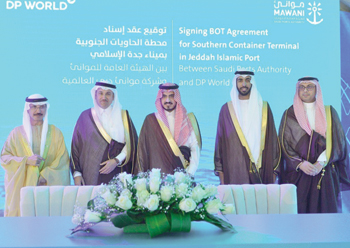DP World to modernise Jeddah Islamic Port
01 January 2020
Global trade enabler DP World said it has secured a 30-year build-operate-transfer (BOT) concession from the Saudi Ports Authority (Mawani), for the management and development of the Jeddah South Container Terminal at the multi-purpose Jeddah Islamic Port.
The agreement was signed by DP World group chairman and CEO Sultan Ahmed bin Sulayem at the Jeddah Islamic Port in the presence of Makkah Acting Governor Prince Badr bin Sultan bin Abdul Aziz Al Saud, Minister of Transport and Mawani’s chairman Engineer Saleh bin Naser Al Jasser, Minister of Industry and Mineral Resources Bandar Alkhorayef, president of Mawani Saad Al Khalb and UAE ambassador to Saudi Arabia Sheikh Shakbout bin Nahyan Al Nahyan.
As per the deal, DP World will invest up to $500 million to improve and modernise the Jeddah Islamic Port, including major infrastructure development to enable the Saudi port to serve the ultra-large container carriers (ULCC’s), which are considered the world’s largest mega containerships.
Established in 1976 on the Red Sea, Jeddah Islamic Port is the largest such facility in Saudi Arabia with annual volumes of over 6 million TEUs.
As a crucial link on the world’s busy east-west trade route and the kingdom’s main commercial centres, the Jeddah port currently handles approximately 60 per cent of the country’s sea-imports and is a strategic hub that connects East-West cargo.
Developing Jeddah Islamic Port will contribute to achieving Saudi Vision 2030 as the project is considered a key milestone towards achieving the targets of The National Industrial Development and Logistics Vision Realization Programme, one of the Vision’s major initiatives.
The concession will also be instrumental in facilitating the smooth and efficient movement of cargo and greater access to local and international markets. DP World has operated the South Container Terminal on a lease agreement for more than 20 years.
As the main trade destination for Saudi Arabia and one of the kingdom’s major port privatisation projects, the new terminal will have an upgraded capacity of 3.6 million TEUs up from 2.4 million TEUs, to meet the expected growth demands of the future, and will provide 1,400 jobs.
- AlFalah Ready Mix wins Red Sea project deal
- Empire Cinemas opens first multiplex in Jizan
- DP World to modernise Jeddah Islamic Port
- GE to set up grid substation at Shuqaiq plant
- Goco is consultant for Amaala wellness resort
- Pultron to provide GFRP rebar to Aramco
- Construction contracts in Q3 hit $12.7bn: report
- Trial operations begin at new Arar airport
- Zahid Tractor is new UD Trucks distributor



